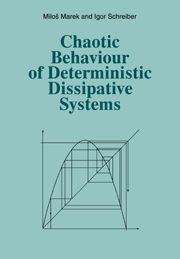Book contents
- Frontmatter
- Contents
- Preface
- 1 Introduction
- 2 Differential equations, maps and asymptotic behaviour
- 3 Transition from order to chaos
- 4 Numerical methods for studies of parametric dependences, bifurcations and chaos
- 5 Chaotic dynamics in experiments
- 6 Forced and coupled chemical oscillators – a case study of chaos
- 7 Chaos in distributed systems, perspectives
- Appendix A Normal forms and their bifurcation diagrams
- Appendix B CONT – a program for construction of solution and bifurcation dia-grams
- Index
7 - Chaos in distributed systems, perspectives
Published online by Cambridge University Press: 24 November 2009
- Frontmatter
- Contents
- Preface
- 1 Introduction
- 2 Differential equations, maps and asymptotic behaviour
- 3 Transition from order to chaos
- 4 Numerical methods for studies of parametric dependences, bifurcations and chaos
- 5 Chaotic dynamics in experiments
- 6 Forced and coupled chemical oscillators – a case study of chaos
- 7 Chaos in distributed systems, perspectives
- Appendix A Normal forms and their bifurcation diagrams
- Appendix B CONT – a program for construction of solution and bifurcation dia-grams
- Index
Summary
Introduction
Several strategies have been followed in theoretical investigations of spatio-temporal coherence and chaos. Spatially distributed nonlinear dynamical systems have been studied as cellular automata coupled map lattices and as partial differential equations (PDEs) which, after a proper reduction or discretization, are studied by various numerical or analogue methods.
Spatially extended dynamical systems may be classified according to continuity or discreteness in space, time and local state. Thus PDEs are continuous in space, time and local state, iterated functional equations are discrete in time and continuous in space and local state, chains of oscillators (discussed in Chapter 5) are discrete in space and continuous in time and local state, lattice dynamical systems are discrete in space and time but continuous in local state and, finally, cellular automata are discrete in all three aspects.
Computer time requirements for the study of evolution of spatio-temporal patterns increase from cellular automata to PDEs drastically. However, seemingly different models of different physical systems have revealed the same types of phenomena (stationary space-time patterns, similar routes to chaos, space-time intermittency). Relations between the results reached through different approaches are gradually being developed. It is expected that in some cases mappings from classes of coupled-map lattices and cellular automata to classes of PDEs will be established in the future.
Various examples of experimental observations of chaotic behaviour in distributed electronic, solid state, chemical and hydrodynamic systems have been discussed in Chapter 5.
- Type
- Chapter
- Information
- Chaotic Behaviour of Deterministic Dissipative Systems , pp. 272 - 288Publisher: Cambridge University PressPrint publication year: 1991



